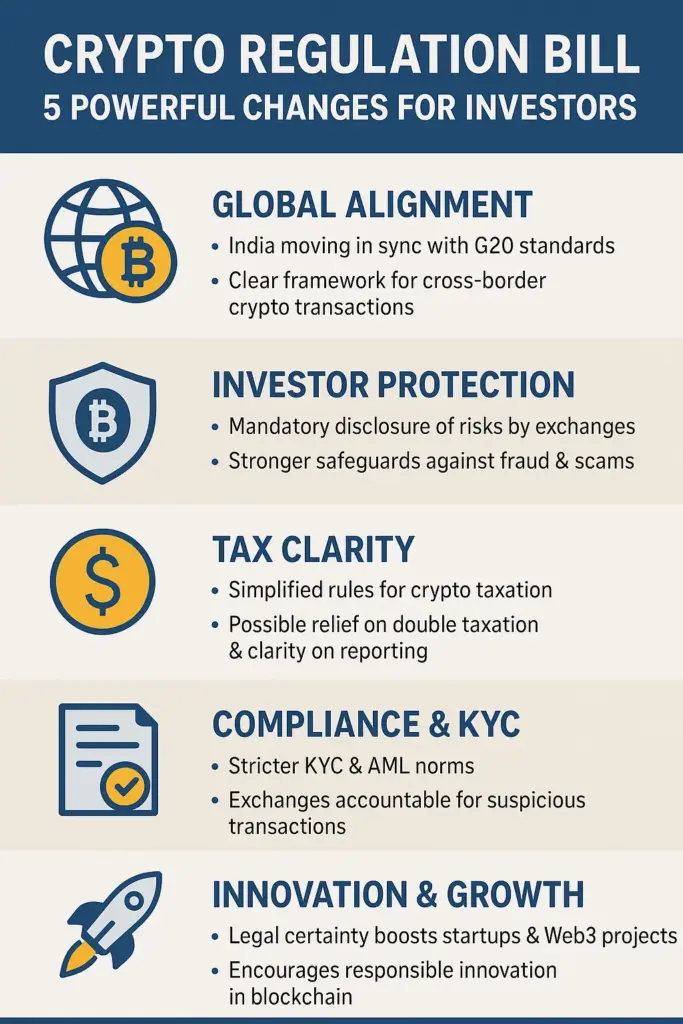September 11, 2025
Crypto Regulation Bill: 5 Powerful Changes for Investors
Crypto Regulation Bill
The cryptocurrency sector has been in focus due to recent global regulatory developments, including India’s ongoing discussions on creating a comprehensive framework for crypto assets, and concerns over illicit transactions and investor protection.
Key Points: Crypto Regulation Bill
Global Push for Regulation:
- The G20 and Financial Action Task Force (FATF) are urging countries to adopt strict rules to prevent money laundering and terror financing through crypto assets.
India’s Regulatory Stance:
- India does not recognize cryptocurrency as legal tender, but it taxes digital virtual assets under the Union Budget 2022.
- The government is working on a Crypto Regulation Bill and also engaging with global bodies to create a uniform framework.
Recent Developments:
- RBI continues to warn about the macroeconomic risks of crypto trading.
SEBI suggested bringing crypto platforms under financial sector regulations. - Discussions are ongoing to link crypto rules with the Prevention of Money Laundering Act (PMLA) to curb illegal activities.
About Cryptocurrency:
- Cryptocurrency is a type of digital or virtual currency that uses cryptography for security and operates on a decentralized network, typically based on blockchain technology.
- It is not issued by any central authority, making it resistant to government interference or manipulation.
- Bitcoin, launched in 2009, was the first cryptocurrency and remains the most popular, followed by Ethereum, Ripple, Litecoin, and others.
Uses include digital payments, investments, remittances, and decentralized finance (DeFi) applications.
Challenges:
- High volatility, leading to investor losses.
- Risk of money laundering, terror financing, and fraud.
- Lack of a global regulatory standard.
- Concerns about data privacy and cyberattacks.
Way Forward:
- Develop a clear legal framework for cryptocurrencies in India.
Strengthen investor protection measures and awareness campaigns.
Integrate advanced technologies like AI for monitoring illegal crypto transactions.
Coordinate with global institutions to create standardized crypto regulations.
About Financial Action Task Force (FATF):
- The Financial Action Task Force (FATF) is an intergovernmental body established in 1989 by the G7 countries to develop policies to combat money laundering, and later expanded to include terrorist financing and financing of weapons of mass destruction (WMDs).
- FATF sets international standards through its 40 recommendations, which are followed by member countries to strengthen their financial systems against illicit financial flows.
- It currently has 39 members, including India, the United States, the United Kingdom, and the European Commission, with many other countries as observers.
- FATF conducts peer reviews (mutual evaluations) of member countries to assess their compliance and effectiveness in implementing anti-money laundering (AML) and counter-terror financing (CFT) measures.
- Countries with serious deficiencies are placed on the “Grey List” for increased monitoring or the “Black List” for high-risk jurisdictions, leading to financial and trade restrictions.
- FATF plays a key role in global initiatives such as tracking cryptocurrency transactions, preventing terror groups’ access to funds, and strengthening banking transparency.
India and FATF:
- India became a member of FATF in 2010.
- India uses FATF standards to combat terror financing, especially in relation to cross-border terrorism.
FATF evaluations have helped India improve laws like the Prevention of Money Laundering Act (PMLA) and FEMA.
September 9, 2025
September 8, 2025
September 4, 2025
September 1, 2025

